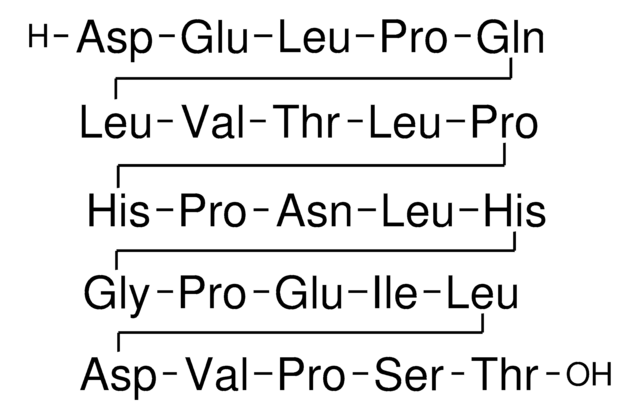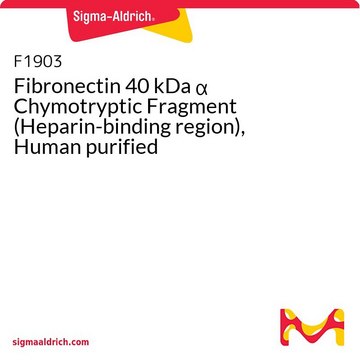F5007
Fibronectin Type III Connecting Segment Fragment 1-25
≥90% (HPLC)
About This Item
Recommended Products
biological source
synthetic (organic)
Quality Level
Assay
≥90% (HPLC)
form
powder
UniProt accession no.
storage temp.
−20°C
SMILES string
CC[C@H](C)[C@H](NC(=O)[C@H](CCC(O)=O)NC(=O)[C@@H]1CCCN1C(=O)CNC(=O)[C@H](Cc2c[nH]cn2)NC(=O)[C@H](CC(C)C)NC(=O)[C@H](CC(N)=O)NC(=O)[C@@H]3CCCN3C(=O)[C@H](Cc4c[nH]cn4)NC(=O)[C@@H]5CCCN5C(=O)[C@H](CC(C)C)NC(=O)[C@@H](NC(=O)[C@@H](NC(=O)[C@H](CC(C)C)NC(=O)[C@H](CCC(N)=O)NC(=O)[C@@H]6CCCN6C(=O)[C@H](CC(C)C)NC(=O)[C@H](CCC(O)=O)NC(=O)[C@@H](N)CC(O)=O)C(C)C)[C@@H](C)O)C(=O)N[C@@H](CC(C)C)C(=O)N[C@@H](CC(O)=O)C(=O)N[C@@H](C(C)C)C(=O)N7CCC[C@H]7C(=O)N[C@@H](CO)C(=O)N[C@@H]([C@@H](C)O)C(O)=O
InChI
1S/C123H195N31O39/c1-19-64(16)97(117(186)140-74(42-58(4)5)106(175)138-78(50-94(167)168)109(178)146-96(63(14)15)122(191)154-40-24-29-87(154)115(184)144-82(54-155)110(179)149-99(66(18)157)123(192)193)147-104(173)72(32-35-92(163)164)134-111(180)83-25-20-36-150(83)90(160)53-129-101(170)76(46-67-51-127-55-130-67)137-105(174)73(41-57(2)3)136-107(176)77(49-89(126)159)139-113(182)85-27-22-39-153(85)121(190)81(47-68-52-128-56-131-68)142-114(183)86-28-23-38-152(86)120(189)80(45-61(10)11)143-118(187)98(65(17)156)148-116(185)95(62(12)13)145-108(177)75(43-59(6)7)135-102(171)70(30-33-88(125)158)133-112(181)84-26-21-37-151(84)119(188)79(44-60(8)9)141-103(172)71(31-34-91(161)162)132-100(169)69(124)48-93(165)166/h51-52,55-66,69-87,95-99,155-157H,19-50,53-54,124H2,1-18H3,(H2,125,158)(H2,126,159)(H,127,130)(H,128,131)(H,129,170)(H,132,169)(H,133,181)(H,134,180)(H,135,171)(H,136,176)(H,137,174)(H,138,175)(H,139,182)(H,140,186)(H,141,172)(H,142,183)(H,143,187)(H,144,184)(H,145,177)(H,146,178)(H,147,173)(H,148,185)(H,149,179)(H,161,162)(H,163,164)(H,165,166)(H,167,168)(H,192,193)/t64-,65+,66+,69-,70-,71-,72-,73-,74-,75-,76-,77-,78-,79-,80-,81-,82-,83-,84-,85-,86-,87-,95-,96-,97-,98-,99-/m0/s1
InChI key
NXAKDBCNODQXBZ-YSZCVPRFSA-N
Gene Information
human ... FN1(2335)
1 of 4
This Item | 10838039001 | F0287 | F1903 |
|---|---|---|---|
| biological source synthetic (organic) | biological source human plasma | biological source human plasma | biological source human |
| form powder | form lyophilized (clear, colorless solution after reconstitution) | form lyophilized powder | form lyophilized |
| UniProt accession no. | UniProt accession no. | UniProt accession no. | UniProt accession no. |
| storage temp. −20°C | storage temp. 2-8°C | storage temp. −20°C | storage temp. −20°C |
| Gene Information human ... FN1(2335) | Gene Information human ... FN1(2335) | Gene Information human ... FN1(2335) | Gene Information human ... FN1(2335) |
Amino Acid Sequence
General description
Biochem/physiol Actions
Storage Class Code
11 - Combustible Solids
WGK
WGK 3
Flash Point(F)
Not applicable
Flash Point(C)
Not applicable
Personal Protective Equipment
Certificates of Analysis (COA)
Search for Certificates of Analysis (COA) by entering the products Lot/Batch Number. Lot and Batch Numbers can be found on a product’s label following the words ‘Lot’ or ‘Batch’.
Need A Sample COA?
This is a sample Certificate of Analysis (COA) and may not represent a recently manufactured lot of this specific product.
Already Own This Product?
Find documentation for the products that you have recently purchased in the Document Library.
Our team of scientists has experience in all areas of research including Life Science, Material Science, Chemical Synthesis, Chromatography, Analytical and many others.
Contact Technical Service






